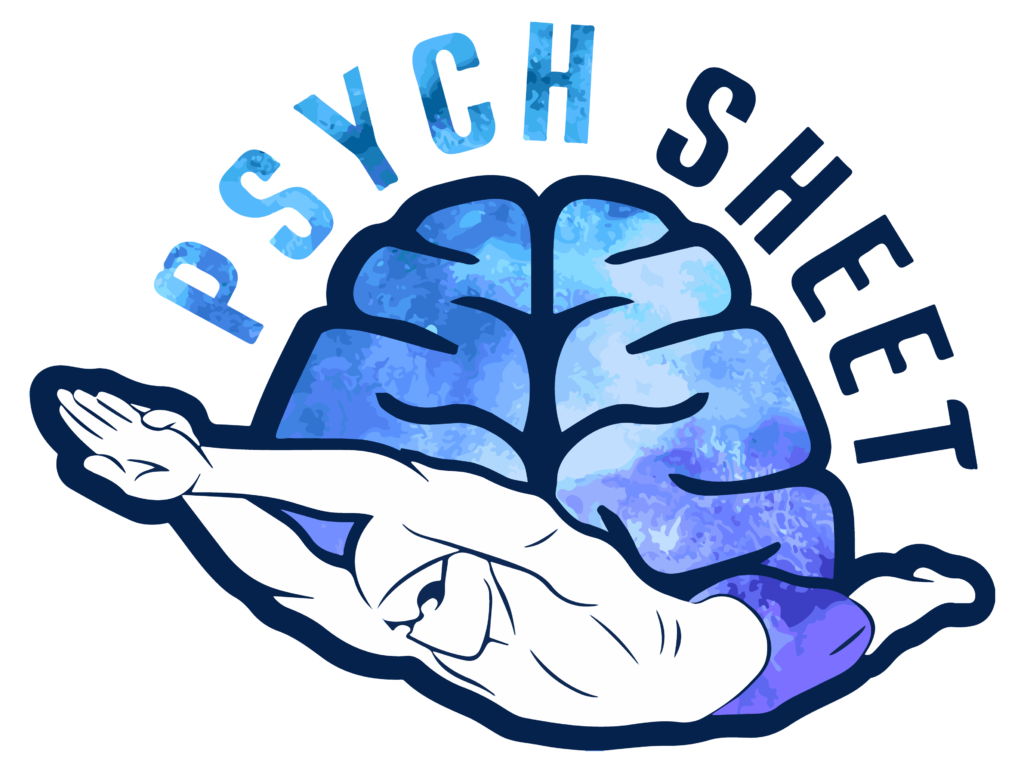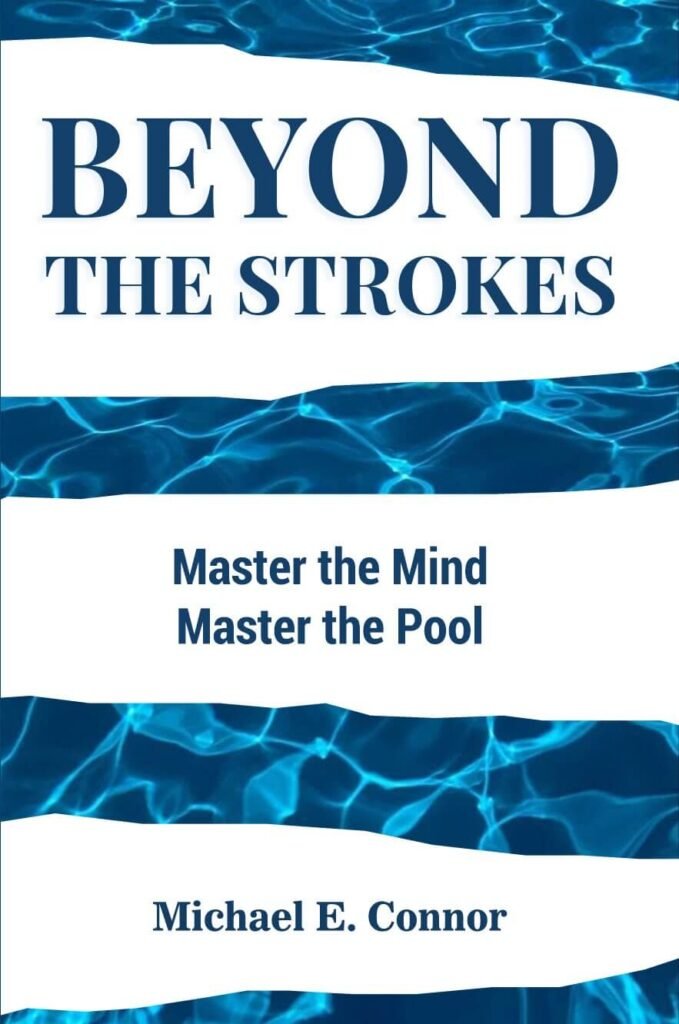Psych Sheet Seminars: The Future of Mental Resilience for Competitive Swimmers
Introduction

Competitive swimming is one of the most demanding sports, requiring athletes to maintain peak physical performance while managing intense psychological pressures. For teen swimmers, the challenges are amplified by the demands of balancing academics, social lives, and the pursuit of excellence in the pool. Psych Sheet Seminars (PSS) takes a revolutionary approach to addressing these challenges by integrating advanced sports psychology techniques with cutting-edge neuroscience and practical tools like The Magical Mind process.
Unlike other mindset modalities, PSS offers a science-backed, holistic framework tailored specifically for swimmers. This ensures athletes not only develop the mental toughness needed to succeed but also cultivate resilience, balance, and joy in their sport and lives. This document explores what sets Psych Sheet Seminars apart, dives into the science of creating new neural networks, and explains how PSS transforms mental obstacles into opportunities for growth.
The Unique Approach of Psych Sheet Seminars
1. Tailored for Competitive Swimmers
While many mindset modalities focus on general mental resilience, PSS specializes in the unique demands of swimming. The sport’s repetitive nature, long training hours, and emphasis on individual performance require tailored psychological strategies.
Key differentiators include:
- Swimmer-Specific Workshops: Focused on overcoming pre-race anxiety, building in-the-zone mental states, and coping with post-race analysis.
- Performance Visualization Techniques: Guided exercises that simulate swim meets, helping athletes anticipate and manage high-pressure moments.
- Integration of Parental and Coaching Support: Recognizing the significant roles of parents and coaches in an athlete’s mental landscape, PSS offers specialized training to align all stakeholders.
2. The Magical Mind™ Process
At the core of PSS is The Magical Mind™ process, a proprietary methodology designed to harness the power of the brain’s neuroplasticity. This process helps athletes identify limiting beliefs, replace them with empowering ones, and create lasting changes in their thought patterns.
Key components include:
- Awareness: Athletes learn to recognize self-sabotaging thoughts and behaviors.
- Reprogramming: Through guided exercises, swimmers actively rewrite their mental scripts, fostering positivity and resilience.
- Anchoring: Techniques such as breathwork and mindfulness are used to embed new neural pathways, making positive changes automatic and sustainable.
3. Evidence-Based Approach
PSS integrates the latest findings in neuroscience and sports psychology. This evidence-based approach ensures that every technique is scientifically validated, maximizing its effectiveness. Key areas of focus include:
- Neuroplasticity: Harnessing the brain’s ability to rewire itself, creating new patterns of thought and behavior.
- Cognitive Behavioral Techniques: Helping athletes reframe challenges and maintain a growth-oriented mindset.
- Mindfulness Practices: Reducing stress and enhancing focus through mindfulness meditation and body awareness exercises.
How We Know It Works

Psych Sheet Seminars is grounded in practical results, demonstrated by its profound impact on athletes and individuals facing significant challenges. The methods offered by PSS have been utilized and validated by its founder, Michael E. Connor, author of Beyond the Strokes: Mental Training for Swimmers and Their Support Groups. Mike’s personal journey is a testament to the effectiveness of these modalities.
At the age of 54, Mike suffered 12 strokes, leaving him with debilitating cognitive and physical challenges. Determined to reclaim his life, he applied every strategy now offered through Psych Sheet Seminars, from visualization and mindfulness to neuroplasticity-based techniques. Over time, Mike not only regained his brain function but also developed a deeper understanding of how to unlock human potential in the face of adversity.
In his groundbreaking book, Mike identifies the Six Sabotaging Beliefs that often hinder performance and personal growth:
- I’m not good enough.
- If I can’t be perfect, I’ll fail.
- Other people’s opinions define me.
- I don’t deserve success.
- Mistakes are unforgivable.
- It’s too late for me to change.
Through the techniques taught at PSS, individuals learn to dismantle these beliefs and replace them with empowering alternatives, fostering a mindset of resilience and growth. Mike’s recovery and his contributions to the field of mental training underscore the power of these tools, offering hope and transformation to swimmers and teams worldwide.
The Science of Creating New Neural Networks
1. Understanding Neuroplasticity
The brain’s ability to reorganize itself by forming new neural connections is known as neuroplasticity. This process is essential for learning, memory, and behavioral change. For athletes, neuroplasticity offers the opportunity to:
- Overcome mental blocks.
- Develop consistent focus and discipline.
- Build confidence through repetition of positive thought patterns.
Neuroplasticity is a process that can be actively shaped through intentional practice. Swimmers, for example, who routinely visualize their races can strengthen neural pathways associated with optimal stroke technique and competitive mindset. This type of "mental rehearsal" primes the brain for success, creating a mental blueprint that translates into physical execution.
2. The Role of Repetition and Emotion
Studies show that repetition combined with emotional engagement accelerates the formation of new neural pathways. When swimmers visualize themselves succeeding and pair this imagery with positive emotions—such as excitement, pride, or calm confidence—they strengthen the neural circuits associated with confidence and peak performance. PSS leverages this principle through daily visualization and emotional anchoring exercises.
Moreover, emotional engagement ensures that the lessons "stick." For instance, a swimmer who celebrates small wins during training reinforces positive emotions tied to effort and improvement. Over time, this builds an intrinsic motivation system that sustains performance gains.
3. Practical Applications for Swimmers
- Visualization Drills: Athletes practice mental simulations of races, focusing on stroke technique, pace, and finishes.
- Positive Reinforcement: Coaches and athletes use affirmations and constructive feedback to solidify new mental habits.
- Habit Stacking: Integrating mindset exercises into existing routines (e.g., combining visualization with stretching).
The Power of The Magical Mind™ Process
1. Identifying Limiting Beliefs
Limiting beliefs such as “I’ll never be fast enough” or “I always choke under pressure” can sabotage performance. These beliefs often stem from past failures, negative feedback, or fear of judgment. The Magical Mind process begins by helping athletes identify these beliefs and understand their origins.
For example, a swimmer who consistently struggles during high-pressure races may uncover a belief tied to perfectionism: "If I’m not flawless, I’ll fail." Understanding this belief allows the athlete to confront it and replace it with a healthier perspective.
2. Replacing Limiting Beliefs
Using tools like guided imagery and cognitive reframing, athletes learn to replace negative beliefs with empowering ones. For example, “I’ll never be fast enough” becomes “I’m consistently improving and achieving personal bests.”
Reframing involves consciously choosing language that emphasizes growth and effort over fixed outcomes. By doing so, athletes not only change their mindset but also influence their physiological responses to stress, enabling better performance under pressure.
3. Building Neural Anchors
Neural anchors are mental shortcuts that instantly trigger positive emotions or states of focus. Athletes practice creating anchors through:
- Sensory Cues: Using specific smells, sounds, or physical gestures to trigger a desired state.
- Visualization Practices: Pairing mental imagery with positive affirmations.
- Mindfulness Exercises: Grounding in the present moment to reduce anxiety.
Scientific Data Supporting Mindset Transformation
1. Neuroplasticity in Action
Research demonstrates that targeted mental training can:
- Enhance motor skills and reaction times.
- Improve stress regulation and emotional resilience.
- Increase gray matter density in areas associated with focus and decision-making.
2. Case Studies in Sports Psychology
Studies with elite athletes reveal the profound impact of mental training:
- A 2021 study found that athletes who practiced visualization before competitions improved their performance by an average of 15%.
- Research published in the Journal of Sports Psychology highlights the role of mindfulness in reducing performance anxiety, with participants reporting a 30% decrease in pre-competition stress.
3. Mental Health Trends Since 2020
COVID-19 has exacerbated mental health issues, particularly among teens. A CDC survey in 2020 revealed that 32.9% of teens aged 12-17 experienced symptoms of anxiety or depression, a marked increase from prior years. Social media further magnifies these issues, creating unrealistic standards and fostering comparisons that erode self-esteem. Teen athletes, already navigating the pressures of competitive environments, are disproportionately affected.
How COVID-19 and Social Media Have Exacerbated Mental Health Challenges
1. Impact on Teen Athletes
Teen athletes face unique challenges:
- Performance Pressure: Coping with expectations in competitive environments.
- Recovery Struggles: Anxiety can prolong recovery from injuries and diminish performance.
- Social Withdrawal: Pandemic-induced isolation magnified feelings of loneliness.
2. Statistical Insights
- A CDC survey in 2020 reported that 32.9% of teens aged 12-17 experienced anxiety or depression, a marked increase from pre-pandemic levels.
- The combination of social media comparisons and academic pressures has exacerbated self-esteem issues in teen athletes.
How Psych Sheet Seminars Stands Out
1. Holistic Athlete Support
PSS recognizes that mental resilience isn’t built in isolation. Our programs address:
- Athletic Needs: Building confidence, focus, and competitive edge.
- Personal Growth: Developing life skills like time management and emotional regulation.
- Community Support: Equipping coaches and parents with tools to foster a positive environment.
2. Integration with Existing Training
Unlike generic programs, PSS seamlessly integrates with swim club routines. Exercises are designed to complement physical training, ensuring mental conditioning doesn’t feel like an added burden.
3. Commitment to Long-Term Impact
PSS doesn’t just focus on short-term results. Our programs aim to instill habits and skills that benefit athletes throughout their lives, both in and out of the pool.
Suggested Actions
For Swim Clubs:
- Host Seminars for Coaches and Staff: Conduct specialized seminars for swim club coaches and staff to enhance their understanding of sports psychology principles and techniques. This can help coaches better support their athletes' mental well-being and performance.
- Integrate Mental Conditioning into Training Programs: Collaborate with swim clubs to integrate mental conditioning sessions into their regular training programs. These sessions can focus on stress management, goal setting, visualization techniques, and building a positive team culture.
- Offer Parent Workshops: Organize workshops for parents of swim club members to educate them on the importance of mental resilience in athletic success. Provide tips and strategies for parents to support their children's mental well-being and performance in swimming.
- Provide Individual Consultations: Offer individual consultations with sports psychologists for swim club members who may benefit from personalized support. These consultations can address specific mental challenges, develop coping strategies, and set performance goals.
- Create a Supportive Environment: Foster a supportive environment within the swim club that prioritizes mental health and well-being. Encourage open communication, peer support, and access to resources for athletes facing mental health challenges.
For Individual Athletes:
- Attend Mental Conditioning Workshops: Participate in Psych Sheet Seminars' workshops tailored specifically for individual athletes. These workshops can provide practical tools and techniques for managing stress, building resilience, and enhancing performance mindset.
- Develop Life Skills: Learn valuable life skills such as stress management, time management, and decision-making through sports psychology sessions. These skills are not only beneficial for sports performance but also for personal development and success in various areas of life.
- Receive Individualized Support: Benefit from individual consultations with sports psychologists to address personal mental health and performance challenges. Receive personalized guidance, feedback, and strategies to overcome obstacles and reach athletic goals.
- Utilize Mental Tools: Learn how to utilize mental tools such as visualization, goal setting, positive self-talk, and mindfulness to enhance performance and confidence in swimming competitions.
The Future of Mental Training in Swimming
As the understanding of sports psychology and neuroscience continues to evolve, so too will the tools and techniques available to athletes. PSS is committed to staying at the forefront of this field, continually refining our offerings to ensure swimmers have access to the best resources for mental resilience and performance optimization.
By combining swimmer-specific insights, the transformative power of The Magical Mind™ process, and the latest scientific research, Psych Sheet Seminars empowers athletes to transcend limitations and achieve their full potential. With PSS, mental obstacles become opportunities, and every swimmer learns to thrive—both in the pool and beyond.
This comprehensive approach ensures PSS isn’t just another mindset modality—it’s a revolution in how athletes think, train, and succeed.
